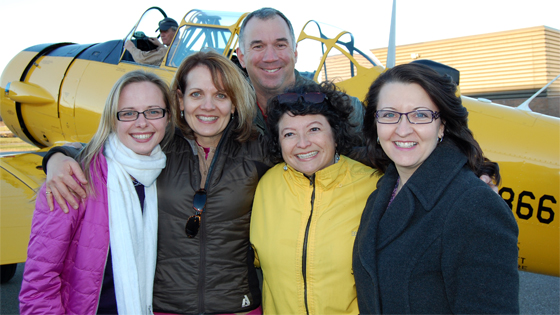
Retired Lt. Col. Steve Will (back) showed (left to right) Ilze Berzina, Laura Wilding, Cristina Rojas and Dr. Lucie Filteau the parallels between aviation safety and patient safety before they took to the skies in a World War II training plane.
Four lucky staff members sat down with an ex-Snowbird pilot to discuss aviation safety and how its full debriefings, standardized checklists and willingness to admit and learn from mistakes can apply directly to patient safety. And to cement the lesson, they took to the skies in a World War II training plane for four short missions.
Despite some initial nervousness, Ilze Berzina, Dr. Lucie Filteau, Cristina Rojas and Laura Wilding were all wide grins and thumbs up when the bright yellow Harvard landed after doing rolls, cloverleafs and loops above the Gatineau Airport. The four won their experience in the early-bird registration draw for the 9th annual TOH Patient Safety Conference.
Wilding, an Advanced Practice Nurse in the Civic Emergency Department, said the flight made her initially feel just as patients must feel: well outside their comfort zone and having to trust those in charge. But the experience ended up being positive.
The next day, retired Lt. Col. Steve Will, who now flies for WestJet and runs his own leadership-training company, explained the parallels at the conference, saying that many of the safety and error-prevention strategies used in aviation apply to health care, such as investigating the root causes of accidents and developing programs and interventions to reduce the risk of harm.
“We debrief every single mission we do,” Will said. “Look for ways to improve. What did we do well? What should continue as a best practice? What didn’t go well? Why? How do we fix it? You need a protocol for debriefs – that’s what I preach.”
Debriefs must be open, with egos checked at the door, everyone present and everyone willing to honestly discuss how their actions affected the team. Team members must be able to trust their colleagues and know that their honesty will not result in disciplinary action.
“We don’t debrief enough,” Wilding said. “There’s a lot we could learn from this experience that would apply to us in health care.”
Dr. Filteau, an anesthesiologist, said surgery teams have debriefs, but not full debriefs as Will described. “We don’t sit there and say ‘Is there anything we should have done better?’ But it’s a start.” She said medicine traditionally strives for a culture of perfection. “It’s so hard to admit a mistake to yourself. And then to accept that and talk about it to others is very difficult.”
“Trust is an important factor to build strong teams,” said Rojas, Performance Measurement Analyst. Berzina, Core Reviewer of Adverse Events, agreed, adding that the ability to have candid conversations about issues is also key.
“It’s a paradigm shift for most corporations,” said Will. “Even if it’s driven from the top down, as it should be, it takes almost a generation to entrench.”

Support patient care and research at
The Ottawa Hospital


 To reset, hold the Ctrl key, then press 0.
To reset, hold the Ctrl key, then press 0.